The Weight of a Butterfly
- gldobbs
- Nov 8, 2025
- 6 min read
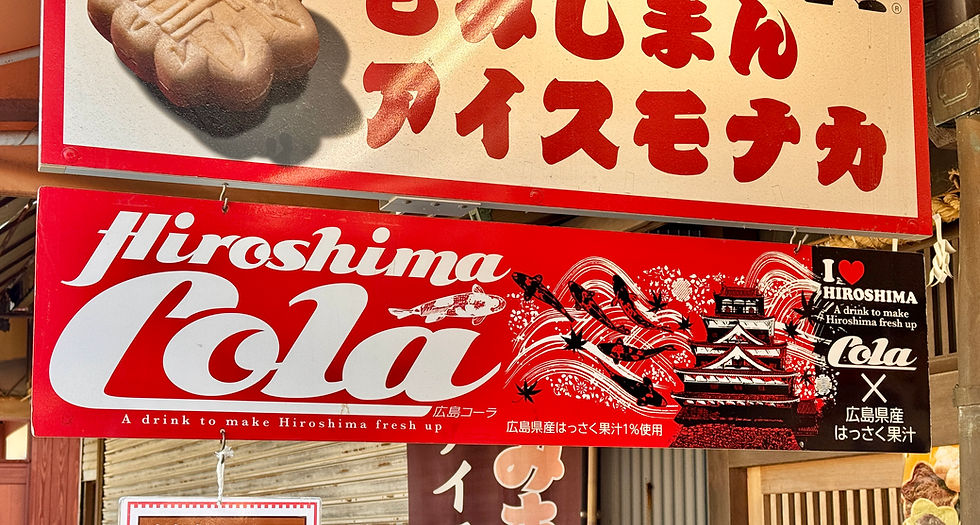
November 7-8, 2025
“The crux of the matter is whether total war in its present form is justifiable, even when it serves a just purpose. Does it not have material and spiritual evil as its consequences which far exceed whatever good might result? When will our moralists give us an answer to this question?”
― John Hersey
“I was against it on two counts. First, the Japanese were ready to surrender, and it wasn't necessary to hit them with that awful thing. Second, I hated to see our country be the first to use such a weapon.”
-Dwight D. Eisenhower
"Because of other countries testing programs, I have instructed the Department of War to start testing our Nuclear Weapons on an equal basis.”
(Something that hasn’t been done in over 30 years)
-Donald J Trump
Hiroshima is one of those evocative cites that stirs emotions.
Their are other places in the world whose very name invokes a reaction. The feeling may be subtle or profound, but is one the less real. Names such as Tiananmen Square, The Western Wall, The Cu Chi Tunnels in Vietnam, Alcatraz, The World Trade Center Site, and Dealey Plaza in Dallas number among these locations.
Hiroshima joins that list because it was here where the world was split apart in a single moment. Everything changed. We could now destroy ourselves.







It is hard to see that when you first arrive. Today’s Hiroshima is a very modern port city of 1.5 million people. It is one of the largest cities in Japan and home to multiple industries. It is a little hard to believe that only 80 years ago this entire city was incinerated to the ground.
It was a beautiful Fall day when we took the trolly to the Peace Park. As we got off near the river, there it was, Genbaku. Genbaku, or the Atomic Bomb Dome, has become the symbol of what happened here 80 years ago. It sits about 100 yards from ground zero. The building was made of solid concrete and was put up as an office building in 1915.

It is quiet and peaceful as it sits among the leafy trees. People gather around the outside just staring at it quietly. As I said, this is a evocative place. From this point for 4 square miles in all directions a terrible blast followed by a fireball with the heat of the sun radiated in all directions.





The population here at the time of the bombing was 350,000. 70,000 people died instantly. By the end of December, a total of 140,000 would be dead as a result of radiation and burn injuries.




There are thousands of terrible stories here that form the aftermath of the attack. Sadako Sasaki was two years old when the blast occurred. She survived the initial blast wave only to be pummeled by radiation. Her young bone marrow developed aggressive Leukemia. Despite her young age, she knew she would not live to be an adult. She vowed to make 1000 origami cranes, a symbol of peace, before she died.

She did not make it. She died at the age of 12. These are her last photos. But her story touched millions around the world and funds were raised to build a memorial

This is the Children’s Peace Memorial dedicated to her. There were numerous children’s groups visiting that day. This group sang underneath the monument and rang the bell inside.




Should we have dropped this bomb? It is impossible to put your minds into the decision makers in 1945. The world is just different now. And the Japanese government conducted the war with suicidal ferocity. They were brutal and savage in their treatment of occupied populations. All of this is understandable as a rationale to do it. We spent billions on the device meant for Germany, but they were defeated before it was ready. What are we going to do with it?


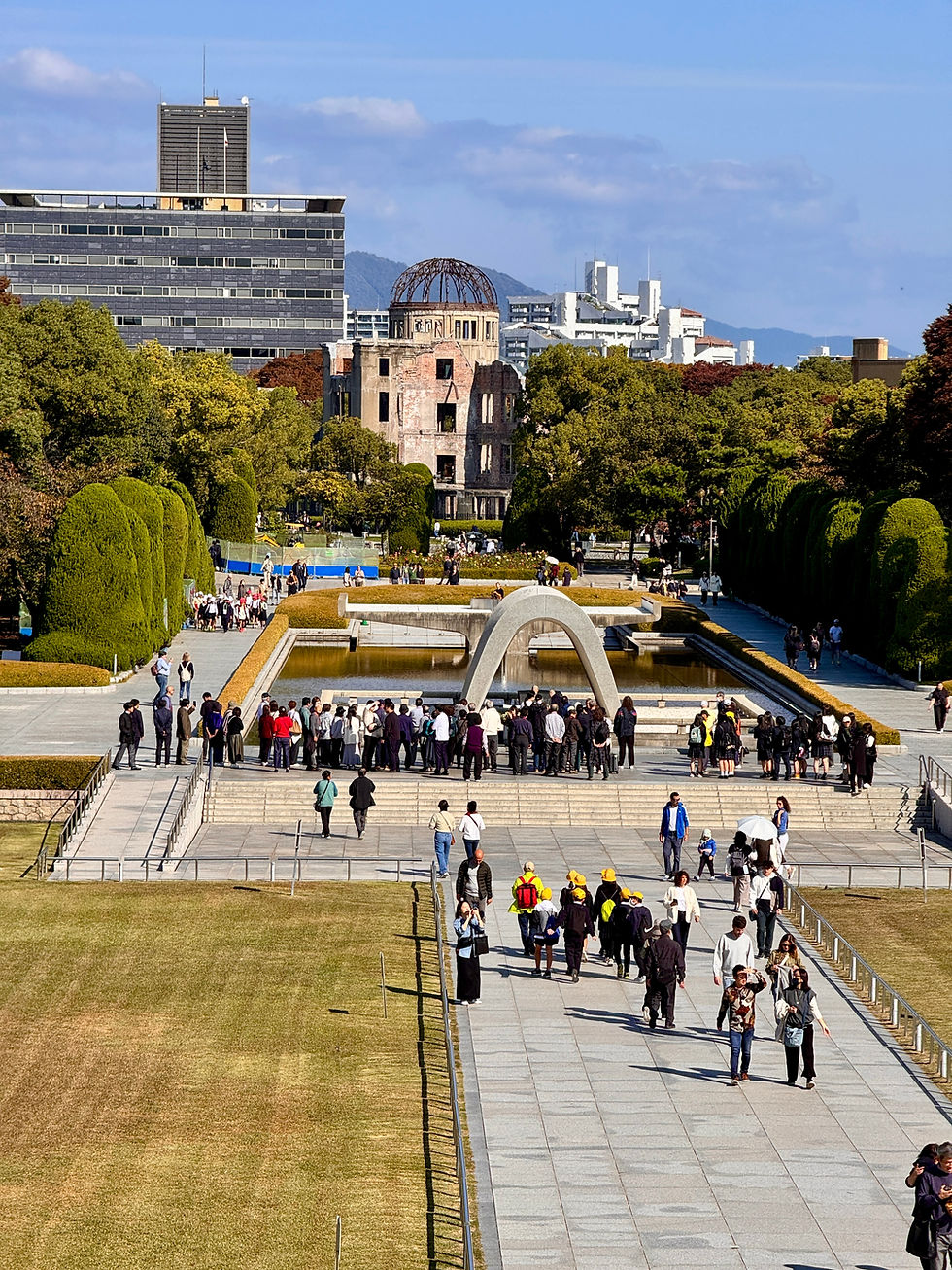


However, contemporary historical scholarship argues that it was a mistake to drop a nuclear bomb. Japan was at that time deeply on its back foot. It had no further resources to fight and was already suing for peace through third parties. The device is so destructive that it mostly just killed civilians and had little to no strategic value to end the war. It completely violates the principles of “Just War” - meaning that use of force should be proportionate, targeted at military objectives, and used only when necessary. Evidence now shows that there was pressure to use the device as a display of power to the Soviet Union and its rising threat.

And we did it twice in just three days.
We asked through a well designed museum which displayed in graphic detail the level of suffering that occurred here to unarmed civilians. Many displays were quiet, respectful, and spoke for themselves.

The journalist John Hersey wrote the definitive account of the bombing. Published in installments in The New Yorker Magazine, Hersey’s account changed the world’s thinking about the devices. Instead of trying to look at the issue from a geopolitical standpoint, Hersey instead focused on 6 survivors of the blast. He told their stories unflinchingly. His accounts were complied into a book “Hiroshima” and was read around the world., It still is today.

His searing portrayal of these victims lives changed US policy and the United Nations stance on the weapons. The attitude of “Look how mighty we are!” changed to “We must never do this again”. Many contend, through the work of Hersey, that it is not mutually assured destruction, that keeps the belligerent parties at bay, but rather it is the memory of Hiroshima.
Finally, consider this…”Little Boy”, the bomb type that was dropped here was notoriously inefficient. Only 1.38% of its uranium core underwent fission and ignited here. Essentially the weight of a butterfly did all of the damage.


We left the park and took a refreshing walk to Hiroshima Castle. Again , the weather was sublime and after the peace park it nice to walk among the fall colors and numerous maple trees. Hiroshima castle is a smaller castle of the similar medieval style we have been seeing. Like everything else here, it was devastated by the bombing, so this is a careful reproduction.



Behind the castle lies Shukkei-en park. This is a circular garden that surrounds a beautiful pond. The land scape is designed to show miniature vistas of Japan and China, crisscrossed by multiple curved bridges.








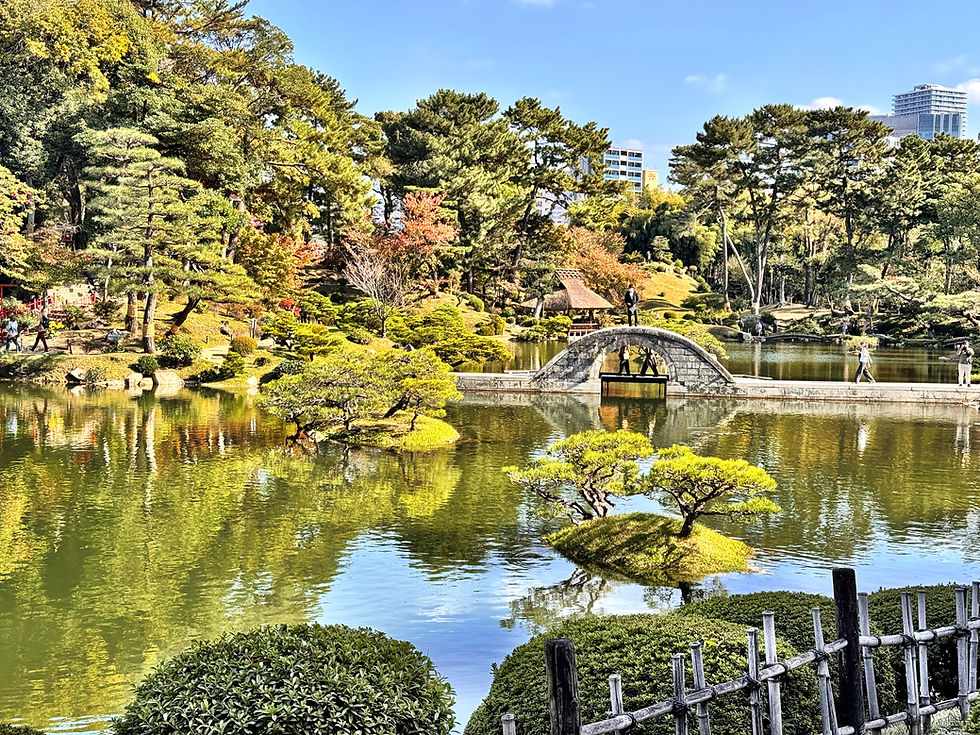



That evening we went to a shopping district near our hotel. It was interesting looking at the many retail stores with names I do not recognize. The merchandise looked high quality and unlike the now ghost like malls we find in the US, the retail scene here appears to be thriving. It may be isolated to this area, but it is certainly busy.







Likewise, the restaurant scene continues to be busy with lines outside many popular venues. We were in search of Okonomiyaki. This is a large savory pancake with multiple ingredients cooked in front of you. In Hiroshima they add a bed of fried noodles to place it on.
It is out of this world delicious and easily my favorite thing I have eaten here.

The next day we took a ferry to the mountainous, deeply forested island of Miyajima. Their are many reasons to travel here, that were equally well known to the thousands of other people who had the same idea. For the first time on this journey we ran into real crowds. Still, the day was beautiful.

Miyajima is perhaps best known for the “Floating Tori Gate”. Other than Mount Fuji, their is perhaps no other photo in Japan as iconic. It is part of a very old shinto shrine, the Itsukushima, that has been here since the 6th century.



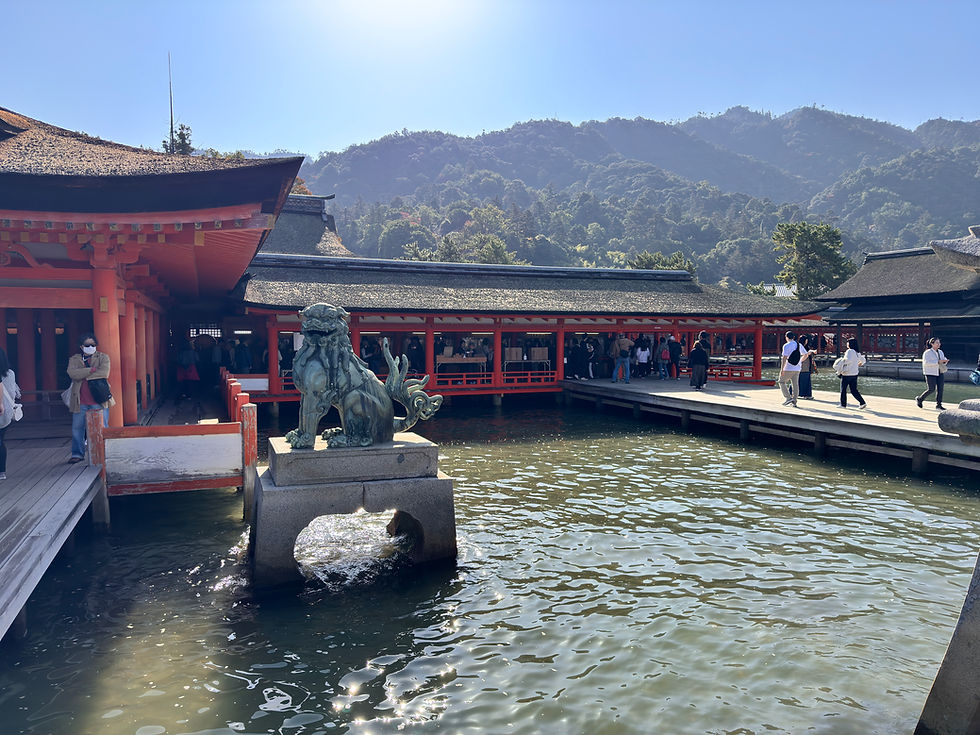


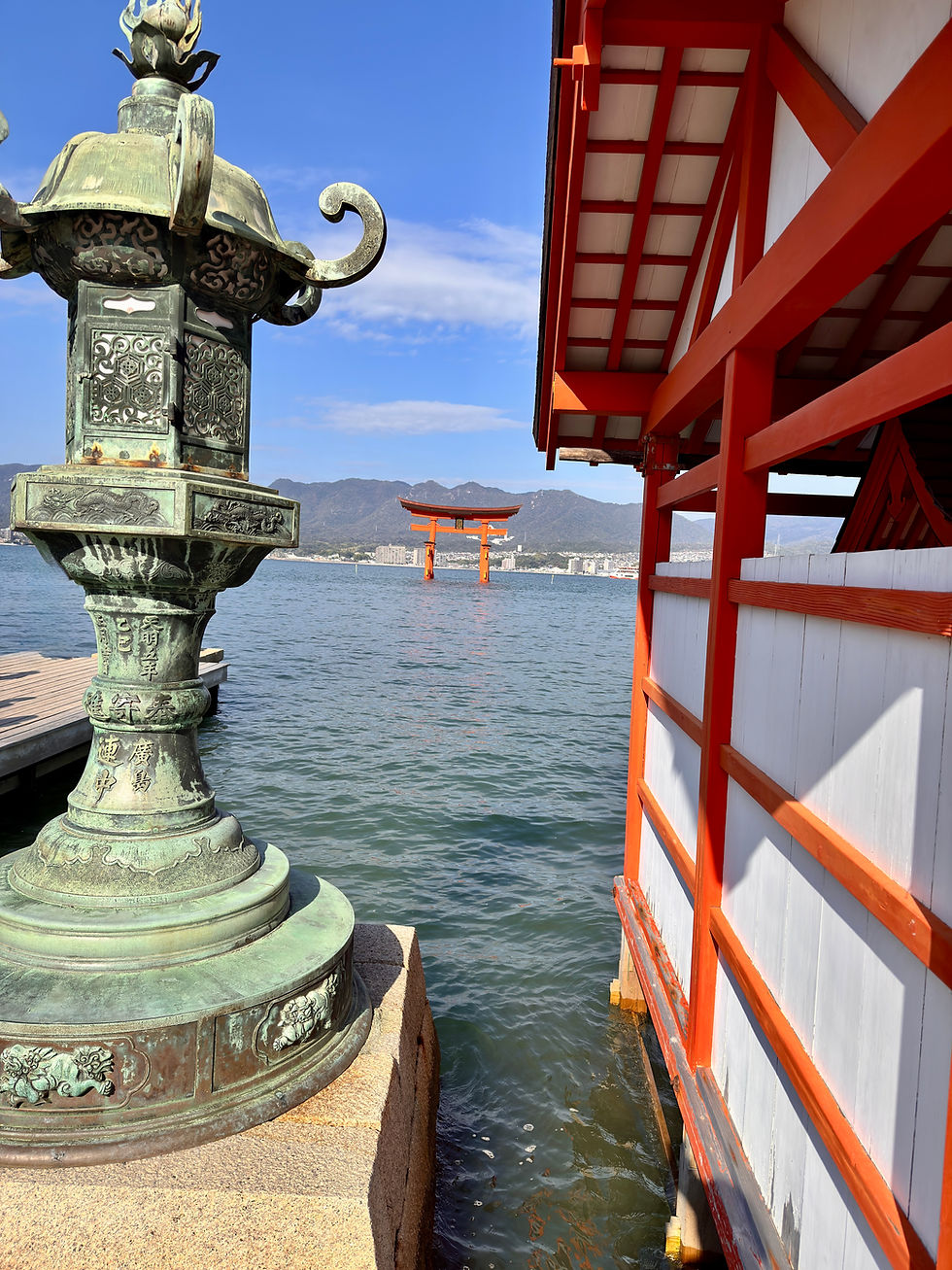


The island is populated by numerous Japanese Sika Deer. They are considered sacred here and have no fear at all of humans. They are everywhere, especially near food stalls. You aren’t supposed to feed them and they can aggressively snatch food from your hand if you aren’t mindful. We saw this several times.




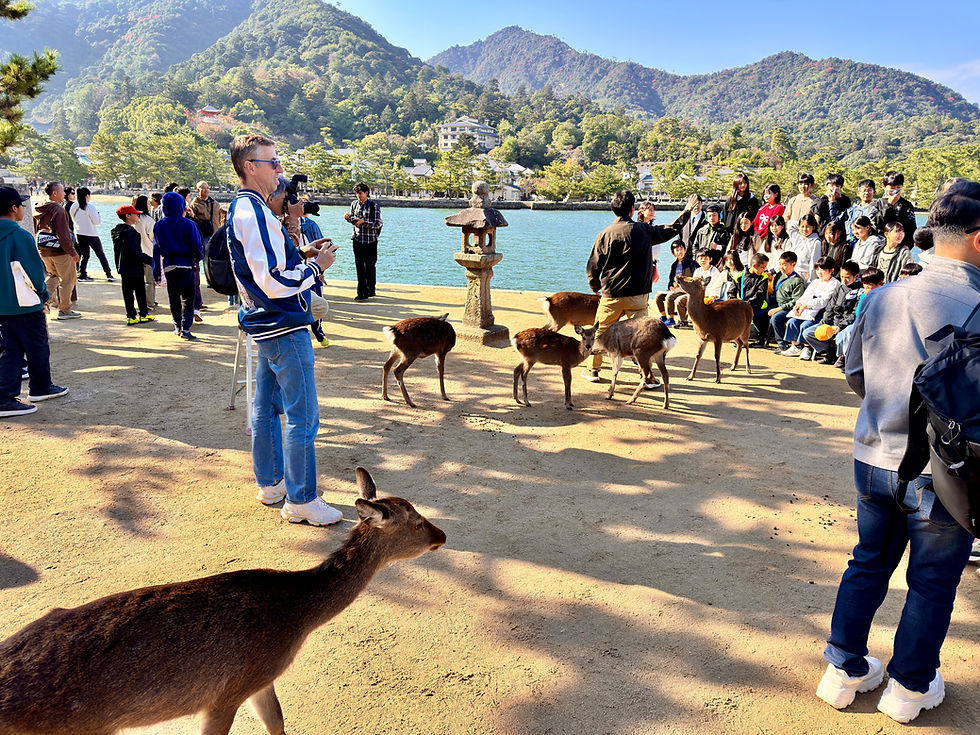













On the island you can also find the Daisho-In Buddhist Temple. Located at the base of Mount Misen (the Mountain we took the ropeway up to see the summit) it is one of the most stunning Buddhist temples in all of Japan. It was founded in 806 CE and offers a peaceful contrast to the hectic Itsukushima Tori Gate Shrine nearby.
























There were hundreds of Buddha statues that adorned the walkway each festooned with a red cap or bib - a sign of worship and blessing.




It has been a very busy two days here. Tomorrow we board the bullet train again and travel to Kyoto.
Oh and we both got Covid again....We are fine and prepared, but geeze






Comments